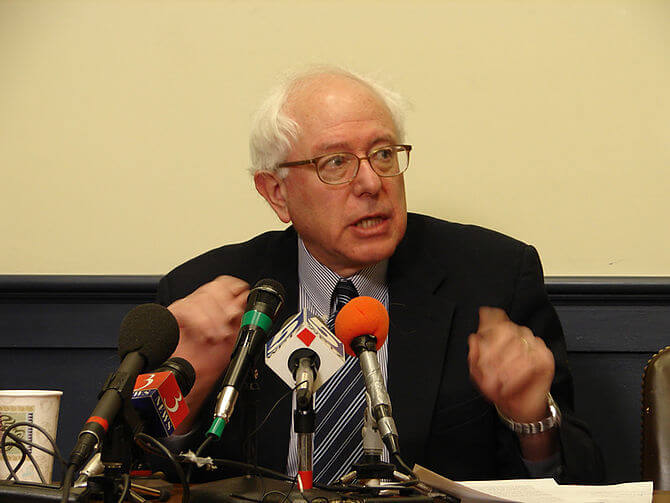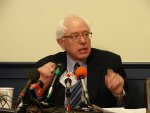Trump withdraws from imbalanced Iran deal
Reaction was widespread and swift after President Donald Trump announced the United States is withdrawing from the nuclear deal former President Barack Obama negotiated with Iran in 2015. Relying on information provided by Israel, Trump said that Iran continues to be the leading voice of violence and terrorism. Trump failed to note that Israel has the largest arsenal of nuclear weapons of mass destruction and refuses to allow for international inspections
By Ray Hanania
President Trump withdrew the United States from the Iran nuclear deal signed during the term of President Barack Obama, drawing reaction from around the world.
Trump called the Iranian Nuclear agreement “a bad deal” and ordered the U.S. Government to reimpose sanctions against Iran. Citing Iran’s involvement in terrorism against moderate Arab countries, Western targets and its support of the Shi’ite militia in Lebanon, Hezbollah, Trump accused Iran’s religious government of violating the human rights of its citizens and others.
In 2015, Iran agreed to a long-term deal on its nuclear program with the P5+1 group of world powers — the US, UK, France, China, Russia and Germany. Trump openly admitted he is relying on information provided by Israel, which has repeatedly made exaggerated accusations not only against Iran but every Arab and Muslim country that has criticized its human rights brutalities against the Palestinians.
The criticism, led by Israel, is hypocritical considering that the only major Middle East region country with nuclear weapons of mass destruction is Israel. Israel has refused to permit international inspectors to view its massive nuclear arsenal which is continues to expand in secrecy and without monitoring. Israel has refused to join the International Atomic Energy Agency (IAEA) which would require it to submit to inspections.

The American Iranian Council criticized Trump’s action asserting that Iran has abided by all aspects of the agreement.
Sen. Bernie Sanders (I-Vt.) delivered a video response to President Donald Trump’s announcement Tuesday that he will pull the United States out of the Iran nuclear agreement. Click here for a video of the speech and see below for a transcript of the remarks.
Here is Trump’s statement, followed by reaction from Saudi Arabia, an extreme critic of Iranian regional terrorism, the American Iranian Council, and Senator Bernie Sanders.
President Trump issued the following statement:
PROTECTING AMERICA FROM A BAD DEAL: President Donald J. Trump is terminating the United States’ participation in the Joint Comprehensive Plan of Action (JCPOA) with Iran and re-imposing sanctions lifted under the deal.
- President Trump is terminating United States participation in the JCPOA, as it failed to protect America’s national security interests.
- The JCPOA enriched the Iranian regime and enabled its malign behavior, while at best delaying its ability to pursue nuclear weapons and allowing it to preserve nuclear research and development.
- The President has directed his Administration to immediately begin the process of re-imposing sanctions related to the JCPOA.
- The re-imposed sanctions will target critical sectors of Iran’s economy, such as its energy, petrochemical, and financial sectors.
- Those doing business in Iran will be provided a period of time to allow them to wind down operations in or business involving Iran.
- Those who fail to wind down such activities with Iran by the end of the period will risk severe consequences.
- United States withdrawal from the JCPOA will pressure the Iranian regime to alter its course of malign activities and ensure that Iranian bad acts are no longer rewarded. As a result, both Iran and its regional proxies will be put on notice. As importantly, this step will help ensure global funds stop flowing towards illicit terrorist and nuclear activities.
IRAN’S BAD FAITH AND BAD ACTIONS: Iran negotiated the JCPOA in bad faith, and the deal gave the Iranian regime too much in exchange for too little.
- Intelligence recently released by Israel provides compelling details about Iran’s past secret efforts to develop nuclear weapons, which it lied about for years.
- The intelligence further demonstrates that the Iranian regime did not come clean about its nuclear weapons activity, and that it entered the JCPOA in bad faith.
- The JCPOA failed to deal with the threat of Iran’s missile program and did not include a strong enough mechanism for inspections and verification.
- The JCPOA foolishly gave the Iranian regime a windfall of cash and access to the international financial system for trade and investment.
- Instead of using the money from the JCPOA to support the Iranian people at home, the regime has instead funded a military buildup and continues to fund its terrorist proxies, such as Hizballah and Hamas.
- Iran violated the laws and regulations of European countries to counterfeit the currency of its neighbor, Yemen, to support the Islamic Revolutionary Guard Corps (IRGC) Quds Force’s destabilizing activities.
ADDRESSING IRANIAN AGGRESSION: President Trump is committed to ensuring Iran has no possible path to a nuclear weapon and is addressing the threats posed by the regime’s malign activities.
- President Trump will work to assemble a broad coalition of nations to deny Iran all paths to a nuclear weapon and to counter the totality of the regime’s malign activities.
- Nations must work together to halt the Iranian regime’s destabilizing drive for regional hegemony.
- In Syria, the Iranian regime supports the Assad regime and is complicit in Assad’s atrocities against the Syrian people.
- In Yemen, the regime has escalated the conflict and used the Houthis as a proxy to attack other nations.
- In Iraq, Iran’s IRGC sponsors Shia militant groups and terrorists.
- In Lebanon, the Iranian regime enables Hizballah to play a highly destabilizing role and to build an arsenal of weapons that threatens the region.
- The Administration’s actions are directed against the malign behavior of the Iranian regime, not against the Iranian people, who are the regime’s longest-suffering victims.
- Nations must work together to halt the Iranian regime’s destabilizing drive for regional hegemony.
- President Trump is making clear that, in addition to never developing a nuclear weapon, the Iranian regime must:
- Never have an ICBM, cease developing any nuclear-capable missiles, and stop proliferating ballistic missiles to others.
- Cease its support for terrorists, extremists, and regional proxies, such as Hizballah, Hamas, the Taliban, and al-Qa’ida.
- End its publicly declared quest to destroy Israel.
- Stop its threats to freedom of navigation, especially in the Persian Gulf and Red Sea.
- Cease escalating the Yemen conflict and destabilizing the region by proliferating weapons to the Houthis.
- End its cyber-attacks against the United States and our allies, including Israel.
- Stop its grievous human rights abuses, shown most recently in the regime’s crackdown against widespread protests by Iranian citizens.
- Stop its unjust detention of foreigners, including United States citizens.
Statement from the American Iranian Council:
The American Iranian Council is dismayed by the Trump administration’s decision today to pull out of the JCPOA.
As we stated on October 13, 2017 when President Trump decided not to recertify the Iran Deal, we oppose the action for a variety of reasons, including:
- The fact that Iran has complied with the terms of the JCPOA. The IAEA has repeatedly confirmed Iran’s compliance and top U.S. military and State Department officials have also confirmed that Iran is complying with the deal;
- The JCPOA is not a bilateral agreement with Iran, but a multilateral agreement among the P5+1, which includes important U.S. allies who continue to express their support for the deal. Rejecting it puts the US on the opposite side of a major international agreement and its allies;
- Scrapping the JCPOA is a dangerous precedent to set given the need for potentially similar diplomatic negotiations with countries like North Korea; and
- Rejecting the nuclear deal harms US interests: it reduces the US’ stature around the world and it replaces the benefits of the deal (such as stability and a non-nuclear Iran) with instability and uncertainty, which could result in additional US military presence in the region.
When we issued our statement back in October we believed that President Trump would use his hardline position on the JCPOA as an opportunity to spur new negotiations not just on the nuclear matter, but on all issues of concern between the US and Iran. Our view stemmed in part from President Trump’s own statements about seeking a broader strategy on Iran, and in part because the notion of replacing an imperfect deal with no deal at all, seemed like an ill-advised strategy.
And yet since October there have been robust efforts by our European allies to salvage the deal by recommending fixes on areas of contention (e.g., ballistic missile testing, Iran’s role in the Syrian civil war, etc.). Still, the Trump administration has rejected these efforts and chosen to pull out of the JCPOA.
Additionally, since October the Trump administration has become more hardline and hawkish with the addition of Secretary of State Mike Pompeo and National Security Advisor John Bolton. The decision now to pull out of the deal – while seemingly illogical on its face – may, for an increasingly hardline administration, appear to offer only win-win scenarios:
Scenario 1: Iran chooses to remain in the deal with our European allies. It does not restart its nuclear program and the Trump administration is able to maintain the benefits of the Iran deal (a non-nuclear Iran), while still removing sanctions relief, hurting Iran’s economy and pushing toward its stated goal of regime change. Re-instituting sanctions will help maintain Iran’s status as an international ‘outcast’ while the US reaps the benefits of the diplomacy it rejects.
Scenario 2: Iran restarts its nuclear program, allowing the Trump administration to claim vindication in its choice to pull out of the deal (e.g., correctly identifying Iran as a “bad actor”) —and providing an excuse to oppose Iran’s nuclear program with military action – something members of the increasingly hardline administration have suggested they are open to pursuing.
Since the Trump administration’s motivation for pulling out of the deal appears to stem from this more aggressive and potentially militaristic position towards Iran, the AIC adds to our list of concerns about this decision what such hardline political calculations do not consider:
- Severe reputational harm to the US and vindication of hardliners in Iran: Not only does pulling out of the deal cause the world to view the US as an untrustworthy and unreliable actor, but the US also garners deeper reputational harm by increasingly being perceived as an aggressor on the world stage and an unreliable proponent of peace. Such a perception plays directly into the hands of hardliners in Iran, offering them a ‘win’ in identifying the US as (a) an untrustworthy actor and (b) a scapegoat – allowing them to blame external forces for Iran’s economic difficulties rather than their own economic mismanagement;
- Stain on diplomacy: The Trump administration’s rejection of diplomacy is a deep stain on the US State Department and the ideal of diplomatic resolution to conflicts that the US has cultivated throughout its history. Pulling out of the JCPOA harms not only the US’ reputation as a peaceful actor but given the US’ prominent role on the world stage, the peace-seeking institution of diplomacy more generally.
- The cost of peace: In the scenario where Iran restarts its nuclear program and the Trump administration responds with force – having tossed aside diplomatic channels – the cost to both sides, will be severe. Even if this hardline administration seeks confrontation, it is important to note that Secretary of Defense Mattis who understands the potential costs, is one of the few remaining, strong supporters of the Iran Deal in this administration.
Senator Sander’s remarks regarding Trump’s withdrawal from the Iranian nuclear deal:
President Trump’s speech today was the latest in a series of reckless decisions that move our country closer to conflict. By reimposing nuclear sanctions on Iran and withdrawing from the Joint Comprehensive Plan of Action, otherwise known as the Iran Nuclear Agreement, President Trump has put our nation on a dangerous path.
We should understand that the JCPOA is not just an agreement between the United States and Iran, but one negotiated alongside other members of the international community including the United Kingdom, France, and Germany, along with China and Russia. The United Nations Security Council also endorsed it.
Trump’s decision isolates the United States from our most important European allies who all continue to support the agreement and have consistently said that it is in their own national security interests to see it upheld.
With today’s announcement, President Trump has also ignored the public statements of his own national security officials like Joint Chiefs Chairman Dunford and Defense Secretary Mattis, both of whom have repeatedly said that staying in the agreement is in the national security interests of the United States.
This agreement is supported by an overwhelming consensus of national security experts around the world. And, I would note, that includes in Israel. Last month, 26 former top-ranking Israeli military and security officials signed a letter urging the United States to maintain the agreement, stating unequivocally that the deal is working and that a U.S. decision to pull out would undermine not just U.S. security, but Israel’s security as well.
These Israeli security leaders wrote, “The consensus among military and intelligence agencies around the world — including Israel’s own defense community — is that the pact is working… Israel’s security interests would be served best if the United States chooses to remain in the agreement, and work with its allies and other parties to the agreement on further diplomatic actions to address other aspects of Iranian policy in the Middle East.”
Withdrawing from the agreement could not only free Iran from the limits placed on its nuclear program, it would seriously harm America’s ability to negotiate future nonproliferation agreements, such as one with North Korea. Why would any country in the world sign such an agreement with the United States, and make the difficult concessions, if they thought that a reckless president might simply discard that agreement a few years later?
If we are genuinely concerned with Iran’s behavior in the region, as I am, this is the worst possible course. It will make addressing all of these other problems harder. Unfortunately, I heard no strategy from Trump today, just the usual bluster.
But bluster and Iran-bashing will not get us to a better future. Ultimately, we must seek a better relationship with the Iranian people and a more constructive role for Iran in the region. Trump’s bellicose rhetoric today makes achieving those goals more difficult. It will strengthen the regime’s hardliners, who are much more comfortable dealing with a hostile America than with a reasonable, peace-seeking one.After 17 years of war in Afghanistan and 15 years of war in Iraq, the American people do not want to be engaged in never-ending wars in the Middle East. I am deeply concerned that that is exactly where President Trump is taking us with regard to Iran. And for anyone who tries to dismiss those concerns, I would remind you that his newly installed National Security Adviser John Bolton wrote an article a few years ago entitled “To Stop Iran’s Bomb, Bomb Iran.” Now Donald Trump seems to be creating his own excuse for doing exactly that.
Importantly, I would remind my fellow Americans that the road to the Iraq war did not simply begin in 2003. It was laid down brick by brick over a number of years, with policy decisions that might have seemed relatively small at the time, but that ultimately led us to the worst foreign policy blunder in the modern history of our country. The Iraq war had enormous unintended consequences that we are still dealing with today, and will be for many years to come. Indeed, one of those unintended consequences was the empowering of Iran in the Middle East.
It is folly to imagine that, having unleashed these problems through the misuse of military force, we can solve them in the same way. Real American leadership, and real American power, is not shown by our ability to blow things up, but by our ability to bring parties together, to forge international consensus around shared problems, and then to mobilize that consensus to address those problems. That is what this agreement did.
Unfortunately, today President Trump put us on a very different, more dangerous path.
END


- Israelisnipers shooting and killing hospital workers in Gaza - December 11, 2023
- CAIR Condemns Israeli Executions of Wounded, Unarmed Palestinian in West Bank - December 11, 2023
- Arab and Muslim American voters face a “simple choice” between Biden’s inhumanity and Trump’s edgy politics - December 9, 2023
























